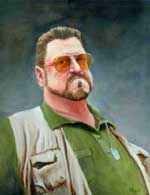A Tiny History Lesson for the Education Blogosphere

I don’t know the guys’n'gals at Fordham, though I’ll admit that I agree with them more than I disagree.
I don’t know The Quick and the Ed’s Kevin Carey, either - I’m about 50/50 on his ideas.
Here’s a lesson to all who have blogs, corporate, foundation, personal or otherwise: Being partisan is fine - just keep it intellectually honest.
Fordham’s Liam Julian is taking some heat from Carey:
Then there’s this gem from an earlier post about “theory” and the practice of teaching:
Is it not true that much of this theory and methodology is a relatively modern invention, one that did not exist a half-century ago, when fine teachers surely did?
If my calculations are correct, a half-century ago was in 1958. John Dewey published Democracy and Education in 1916. The first half of the 20th century (i.e. the pre-1958 half) featured a series of intense ideological debates about the meaning and practice of public education. Whole educational movements rose and fell, each grounded in theory, with a significant impact on schooling for millions of students. How do I know this? Because I-unlike, apparently, Liam-read Left Back: A Century of Failed School Reforms, by noted education historian Diane Ravitch. Liam shouldn’t have any trouble finding a copy-Ravitch is on the Fordham Institute’s Board of Trustees.
Suggestions for summer reading: less blogging and God and Man at Yale, more education policy and history.
I left the following comment on Flypaper, and as soon as TQatE’s blogger platform is actually working again, I’ll leave it there, too:
Liam’s comment about theory is being treated dishonestly. Yes, Dewey published nearly 100 years ago - we all know that. We also know that the mass implementation of Dewey’s theories [really, their offshoots/distortions] are relatively recent.
Disclaimer: I’m implying nothing by citing this example other than a similar timetable to Dewey/education.
Marx and Engels wrote The Communist Manifesto in 1848 - the theory existed through the 19th century, some knew it, some didn’t, it developed. It took about 70 years to mature and be implemented.
It’s little different with Dewey and education.
Carey’s right - there were “intense ideological debates” about public education in the early 20th century, but the effect of those debates on the average teacher’s pedagogy was minimal compared to today.
That’s the reality of movements. They go a little faster now than they used to - 20th/21st century environmentalism took about 30 years as opposed to 19th/20th century Marxism’s 70, for example; the Progressive push to “re-frame the debate” is a feature of a movement that’s taken only a decade to pervade, which is evidence that changes are coming even faster - but they still take time. That’s why we go beyond a book’s publishing date, or the bracketed dates of a man’s life, when we evaluate arguments and prove points re: movements.
The irony in Carey’s suggestion that Julian imbibe “more education policy and history” is laughable after reading such rigid misunderstanding and intellectual dishonesty. My suggestion on summer reading - all reading, actually - is to focus on comprehension and honest evaluation. Otherwise, don’t bother reading at all, because some of us notice.
It’s tempting for some, especially in education policy, to relive those pseudo-scholarly glory days of Political Science 101 or Introduction to Education Theory. Stop that - because again, some of us notice.
In an effort to tamp the pretension in this debate - I prefer the low-brow to the high - I’ll leave Carey with a co-optation from The Big Lebowski:
Carey, you’re out of your element.
One Response to “A Tiny History Lesson for the Education Blogosphere”
Trackbacks/Pingbacks
- The Quick[ly and Easily Rebutted] and the Ed on History, Part II at Education for the Aughts - American School Issues and Analysis - [...] A Tiny History Lesson for the Education Blogosphere [...]



I’m glad to know you agree with me half the time. As a Cooperstown resident and baseball fan, you’re no doubt aware that a .500 batting average is spectacular, so by that measure you’re doing pretty well.
Liam said that the theories “did not exist a half century ago,” which is obviously untrue. You’re saying that I have an obligation to respond to what Liam wish he had said, or should have said, rather than what he did say? Fine — I wish my last post had been the most brilliant and insightful essay yet written, and hereby condemn you for suggesting otherwise.
As to the question — Dewey and his ideas were very influential in his time. Your readers can decide for themselves whether the progressive education movement should be dismissed as insignificant.